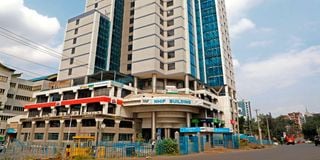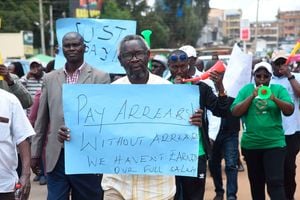
The National Health Insurance Fund (NHIF) headquarters in Nairobi.
MPs were shocked after they were taken through how Sh21 billion was siphoned from the National Hospital Insurance Fund (NHIF) coffers through fictitious claims.
Accountants say that the theft was masterminded through Incurred But Not Reported (IBNR) claims by NHIF, a “creative accounting”, which is an elevated way to steal public funds without raising suspicions that only experts in the accounting field can flag.
The theft, whose details have been laid bare in a petition before the National Assembly, dwarfs looting in other government circles that have seen perpetrators among them county governors, convicted.
Why those who masterminded the scandal are yet to be brought to book, illustrates how individuals are exploring sophisticated methods to steal public funds to evade investigative government agencies.
It is not clear where the billions siphoned from the NHIF coffers were taken to, but the scandal happened just a few months before the August 2022 general election.
The petition by Mr Bernard Muchere, a former internal auditor at the National Treasury and currently a Fraud Risk Assessment consultant, puts the Ministry of Health, NHIF board, and National Treasury in a tight spot.
Mr Muchere, while appearing before the Public Petitions Committee of the National Assembly, accused the government of being complicit in the scandal, noting that the irregular payment “caused a major crisis in the contributors’ medical coverage resulting in most patients being denied treatment with vital consequences.”
“Therefore, I can conclusively state that the IBNR reserves were fraudulently created to enable siphoning NHIF funds,” Mr Muchere told the committee as Vihiga MP Ernest Ogesi, who chaired the committee session, gave an undertaking that “the committee will get to the bottom of the matter.”
“This is a grave matter. The committee will deal with conclusively and those mentioned will be summoned to come and tell us what they know about the claims in the petition,” said Mr Ogesi.
At some point, Mr Muchere went out of his way to explain to MPs, a majority of them appearING clueless on the matter purely technical, how fraudsters have invented the theft of public funds through IBNR claims.
Mr Muchere told the MPs that he relied on the audited financial statements of NHIF for the financial year ending June 30, 2022, concerning financial statements for the financial years 2020/21, 2019/20, 2018/19, and 2017/18 to draw the petition.
He also relied on the constitution of Kenya, the NHIF Act, the Public Finance Management (PFM) Act, and the State Corporations Act to flag the irregular claims.
Mr Muchere claims that upon undertaking a fraud examination on NHIF financial statements, he established that during the preparation of financial statements for the 2021/22 financial year, the NHIF management fraudulently created IBNR claims aggregating to over Sh21 billion.
The creation he says, was done with the help of an actuarial firm- Kenbright Actuarial and Financial Services- and backdated to the 2019/2020 and the previous financial years.
The Petitioner notes that the unbudgeted claims were then charged to the NHIF members’ contributory schemes like Health Insurance Subsidy Programmes for Orphans and Vulnerable Children, and the poor, Older Persons and Persons with Severe Disability (HISP- OVCs and OPPSD).
The dubious payments, Mr Muchere notes, include Sh9.7 billion being proceeds from the National Health Scheme, Sh4.01 billion from the National Police Service (NPS) and Kenya Prisons Service (KPS), Sh2.9 billion from the civil servants' scheme, Sh2.3 billion meant for Linda Mama program and Sh780.7 million from the parastatal scheme.
The others include Sh683.92 million from the EduAfya scheme, Sh525.3 million from the county scheme, Sh190.2 million being proceeds from the retirees’ scheme, Sh31.3 million from HISP- OVCs and Sh6.5 million from HISP- OPPSD.
In 2014, the government, through NHIF, rolled out HISP to cushion OVCs and OPPSDs through a cash transfer programme under the State Department for Social Protection.
What raises suspicion is that the NHIF CEO and the chairperson of the board in their reports contained in the NHIF’s annual report and financial statements for the 2021/22 financial year, “respectively, consciously avoided mentioning and explaining the basis for the IBNR claims.”
“The NHIF CEO and chairperson's noncommittal on IBNR claims is proof of their improbability,” the petition reads.
IBNR, Mr Muchere explains, is a type of reserve account used in the insurance industry as the provision for claims or events that have transpired but have not yet been reported to an insurance company.
IBNR is therefore used by insurance companies, “particularly along the eastern Gulf Coast of the United States where Hurricanes and other natural disasters are common.”
The process of incurring, reporting, and submissions of claims to NHIF is done manually and through the Electronic Health Management Information System (EHMIS).
In the case of the manual, a patient presents an NHIF card and national identification card to a registered health facility empaneled by NHIF.
The contracted health facility provider then requests for pre-authorization by NHIF before treatment can be administered.
It's only upon approval by NHIF that the contracted health facility provider undertakes services and immediately submits its claim to the NHIF for payment.
For the EHMIS, a patient presents their national identification card and biometrics taken by the registered health facility.
In this system, the request for pre-authorization and authorization is in real-time and the claims are also made in real-time through the EHMIS portal upon completion of services.
The petitioner, however, reveals that NHIF’s incurring, approval, and submission of claims’ systems or processes are established in such a way that claims are reported before treatment, “hence IBNR cannot arise in NHIF claims.”
The petitioner notes that there is no evidence of how Kenbright Actuarial and Financial Services was procured and how it determined “the so-called claim-generating events.”
What will be of interest to the petitions committee is that in the NHIF audited financial statements for 2020/21, 2019/20, and the preceding financial years, IBNR reserves were non-existent and only “propped up in the financial year ending June 30, 2022.”
The petitioner claims that he established that the audited financial statements for the financial year ended June 2021 were deceitfully restated, “whereby”, part of the Sh18.7 billion cumulative retained earnings, Sh12.31 billion was converted to IBNR claims reserves.
The committee will also be seeking to establish whether an “unorthodox restatement” of retained earnings was done citing the National Treasury requirements “where the retained earnings for 2019/20 were restated from Sh18.25 billion to Sh2.9 billion “fictitiously” to create Sh15.37 billion IBNR claims reserves.”
He notes that since there is no evidence of a sinking fund bank account wherein the retained earnings were supposed to be deposited, “it follows then the retained earnings were only book entries.”
Mr Muchere says that the irregular payment caused a huge financial crisis that made NHIF unable to pay hospital bills for genuine contributors’ medical coverage “resulting in most patients being denied treatment.”
“This amounted to payment of fictitious patients at the expense of pathetically sick Kenyans,” says Mr Muchere urging the MPs to be harder on the persons of interest who may have aided the siphoning of the public and where possible have them cited for culpability.
The NHIF has since been renamed Social Health Insurance Authority (SHIA) following an amendment to the law and is currently in transition mode.
The Fraud Risk Assessment Expert was able to demonstrate to the MPs how NHIF is “bedeviled with systemic fraud risks, which unless managed properly, will remain exposed to fraud schemes and patient woes will escalate despite a name change.”
He noted that upon analysis of the annual reports and financial statements, there was a lack of evidence supporting the IBNR claims and that the IBNR claims reserves were “fraudulently created to enable the siphoning out of NHIF funds.”
“The facts enumerated in the petition provide proof that IBNR claims were deliberately created to siphon out NHIF funds,” Mr Muchere says adding: “Parliament should establish whether the Health Cabinet Secretary approved the ineligible claims.”
The petitioner claims that offsetting the “fictitious unbudgeted IBNR claims” with the members' scheme contributions created a huge shortfall to NHIF funds “causing serious financial difficulties experienced in the latter part of 2022 to date.
This, he says, led to NHIF drastically scaling down patient benefits and even failing to adequately cover comprehensive benefits, putting most Kenyans in a “serious health quagmire where most are languishing at home only looking up to their God.”
To get to the bottom of the matter, the petitioner wants the National Assembly to compel the NHIF CEO and the board to prepare financial statements “that give a true and fair view of the state of affairs and consequently” identify which healthcare providers benefited from IBNR claims and whether they were authentic.
In the event the claims are found inauthentic, he wants the amount paid to be recovered from the beneficiaries.
The MPs will be keen to establish whether the NHIF board formulated and approved the ineligible IBNR claims “as this was a major policy change” and the “claim-generating events” that elicited the multibillion-shilling claims.
The petition claims that the payment of the claims violated the PFM Act, State Corporation Act, and the NHIF Act, which require the board to prepare financial statements that give a true and fair view of the state of affairs.
What puts the National Treasury in trouble is that “it required the creation of ineligible IBNR claims as stated in the NHIF annual reports and financial statement for the year ended June 30, 2022.”
This is even as the petitioner blamed the Office of Auditor-General for failing to confirm whether NHIF funds were applied lawfully and effectively in the payment of the IBNR claims as required by the constitution.








